Management Skills and Business Success: Comprehensive Analysis Report
VerifiedAdded on 2019/11/26
|12
|3110
|142
Report
AI Summary
This report delves into the critical management skills necessary for achieving business success. It begins by defining the management process and its core components, including planning, controlling, and coordinating resources. The report then explores the impact of cultural and social environments on business operations, highlighting how factors like taxes, market stability, and employee motivation can either hinder or support planned actions. The core of the report focuses on actionable strategies for effective management, such as honesty, delegation of work, strong communication, commitment, positive attitude, inspiration, and a balanced approach to leadership. Each skill is discussed in detail, with explanations of their importance and practical applications within an organizational context. The report emphasizes the importance of avoiding public criticism, fostering a leadership-oriented approach, and understanding the diverse backgrounds of team members. The conclusion stresses the importance of continuous development and adaptation to ensure sustainable business success.
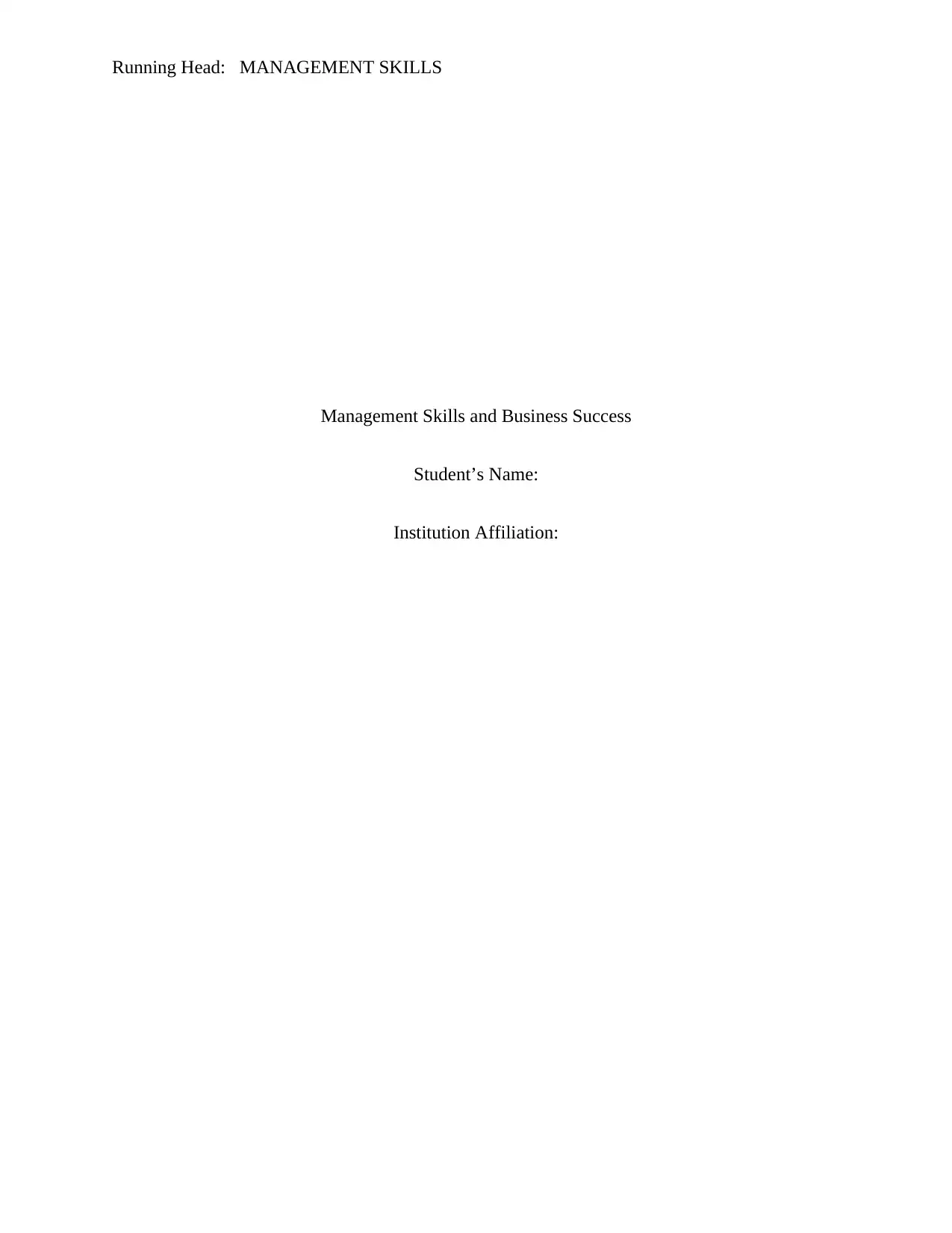
Running Head: MANAGEMENT SKILLS
Management Skills and Business Success
Student’s Name:
Institution Affiliation:
Management Skills and Business Success
Student’s Name:
Institution Affiliation:
Paraphrase This Document
Need a fresh take? Get an instant paraphrase of this document with our AI Paraphraser
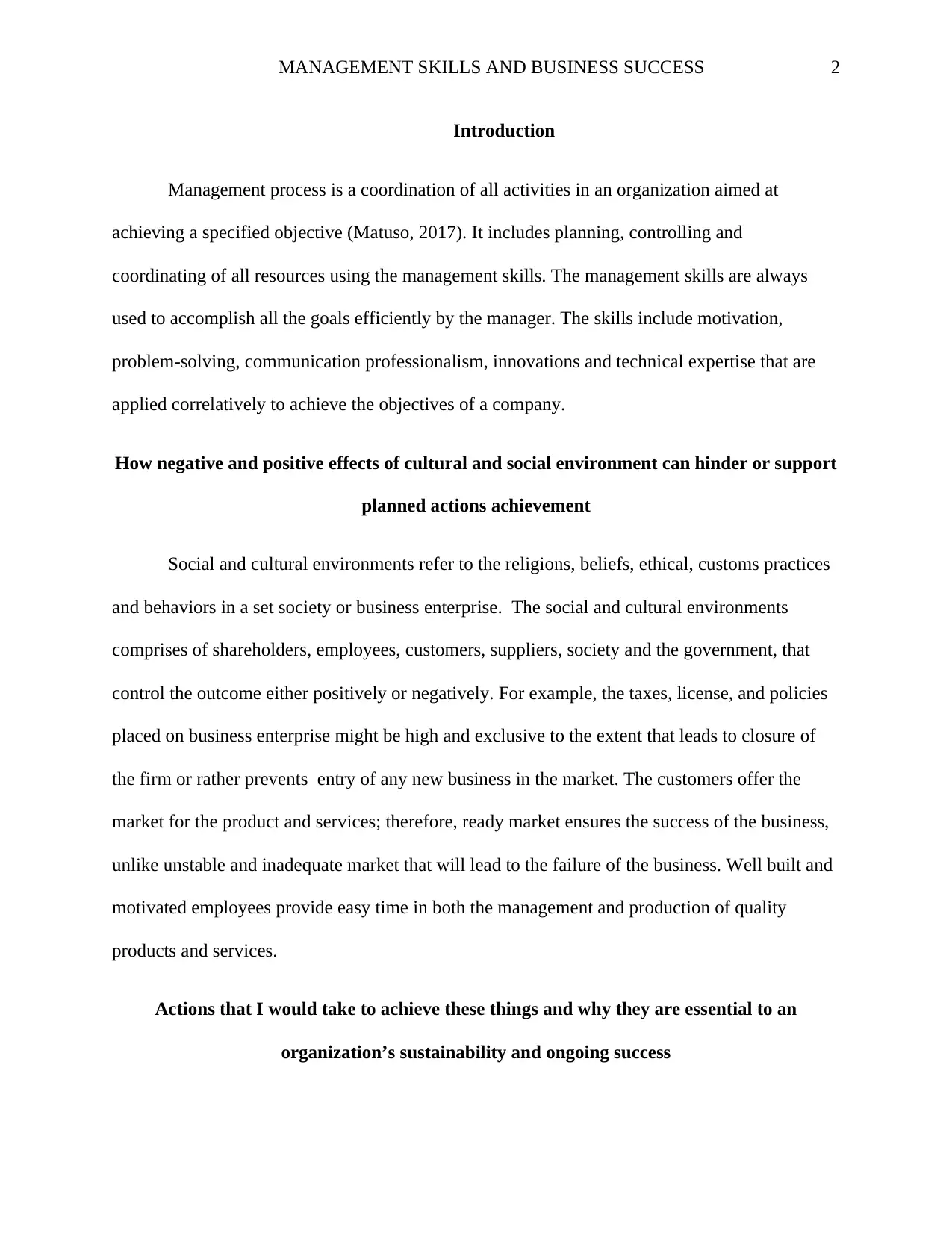
MANAGEMENT SKILLS AND BUSINESS SUCCESS 2
Introduction
Management process is a coordination of all activities in an organization aimed at
achieving a specified objective (Matuso, 2017). It includes planning, controlling and
coordinating of all resources using the management skills. The management skills are always
used to accomplish all the goals efficiently by the manager. The skills include motivation,
problem-solving, communication professionalism, innovations and technical expertise that are
applied correlatively to achieve the objectives of a company.
How negative and positive effects of cultural and social environment can hinder or support
planned actions achievement
Social and cultural environments refer to the religions, beliefs, ethical, customs practices
and behaviors in a set society or business enterprise. The social and cultural environments
comprises of shareholders, employees, customers, suppliers, society and the government, that
control the outcome either positively or negatively. For example, the taxes, license, and policies
placed on business enterprise might be high and exclusive to the extent that leads to closure of
the firm or rather prevents entry of any new business in the market. The customers offer the
market for the product and services; therefore, ready market ensures the success of the business,
unlike unstable and inadequate market that will lead to the failure of the business. Well built and
motivated employees provide easy time in both the management and production of quality
products and services.
Actions that I would take to achieve these things and why they are essential to an
organization’s sustainability and ongoing success
Introduction
Management process is a coordination of all activities in an organization aimed at
achieving a specified objective (Matuso, 2017). It includes planning, controlling and
coordinating of all resources using the management skills. The management skills are always
used to accomplish all the goals efficiently by the manager. The skills include motivation,
problem-solving, communication professionalism, innovations and technical expertise that are
applied correlatively to achieve the objectives of a company.
How negative and positive effects of cultural and social environment can hinder or support
planned actions achievement
Social and cultural environments refer to the religions, beliefs, ethical, customs practices
and behaviors in a set society or business enterprise. The social and cultural environments
comprises of shareholders, employees, customers, suppliers, society and the government, that
control the outcome either positively or negatively. For example, the taxes, license, and policies
placed on business enterprise might be high and exclusive to the extent that leads to closure of
the firm or rather prevents entry of any new business in the market. The customers offer the
market for the product and services; therefore, ready market ensures the success of the business,
unlike unstable and inadequate market that will lead to the failure of the business. Well built and
motivated employees provide easy time in both the management and production of quality
products and services.
Actions that I would take to achieve these things and why they are essential to an
organization’s sustainability and ongoing success
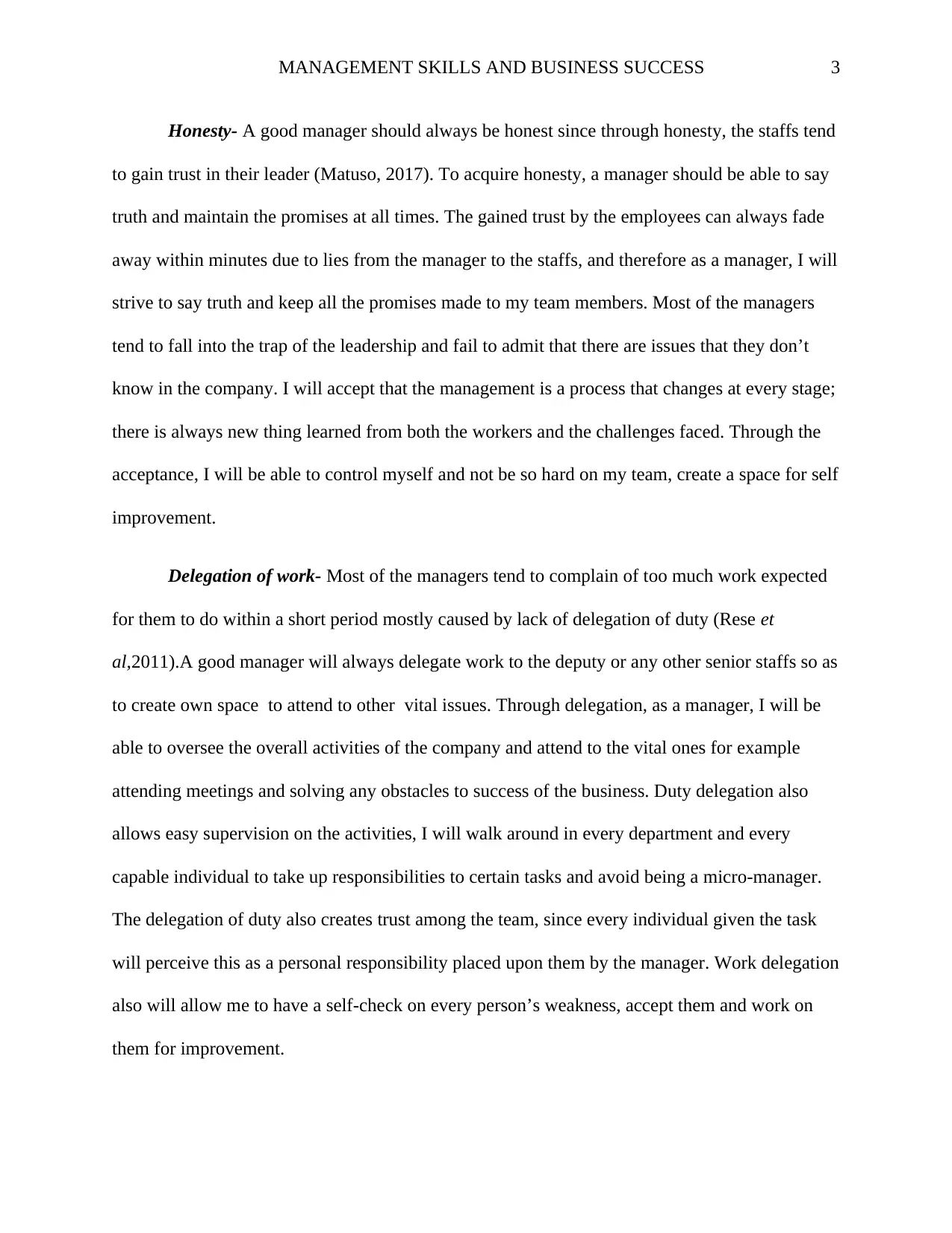
MANAGEMENT SKILLS AND BUSINESS SUCCESS 3
Honesty- A good manager should always be honest since through honesty, the staffs tend
to gain trust in their leader (Matuso, 2017). To acquire honesty, a manager should be able to say
truth and maintain the promises at all times. The gained trust by the employees can always fade
away within minutes due to lies from the manager to the staffs, and therefore as a manager, I will
strive to say truth and keep all the promises made to my team members. Most of the managers
tend to fall into the trap of the leadership and fail to admit that there are issues that they don’t
know in the company. I will accept that the management is a process that changes at every stage;
there is always new thing learned from both the workers and the challenges faced. Through the
acceptance, I will be able to control myself and not be so hard on my team, create a space for self
improvement.
Delegation of work- Most of the managers tend to complain of too much work expected
for them to do within a short period mostly caused by lack of delegation of duty (Rese et
al,2011).A good manager will always delegate work to the deputy or any other senior staffs so as
to create own space to attend to other vital issues. Through delegation, as a manager, I will be
able to oversee the overall activities of the company and attend to the vital ones for example
attending meetings and solving any obstacles to success of the business. Duty delegation also
allows easy supervision on the activities, I will walk around in every department and every
capable individual to take up responsibilities to certain tasks and avoid being a micro-manager.
The delegation of duty also creates trust among the team, since every individual given the task
will perceive this as a personal responsibility placed upon them by the manager. Work delegation
also will allow me to have a self-check on every person’s weakness, accept them and work on
them for improvement.
Honesty- A good manager should always be honest since through honesty, the staffs tend
to gain trust in their leader (Matuso, 2017). To acquire honesty, a manager should be able to say
truth and maintain the promises at all times. The gained trust by the employees can always fade
away within minutes due to lies from the manager to the staffs, and therefore as a manager, I will
strive to say truth and keep all the promises made to my team members. Most of the managers
tend to fall into the trap of the leadership and fail to admit that there are issues that they don’t
know in the company. I will accept that the management is a process that changes at every stage;
there is always new thing learned from both the workers and the challenges faced. Through the
acceptance, I will be able to control myself and not be so hard on my team, create a space for self
improvement.
Delegation of work- Most of the managers tend to complain of too much work expected
for them to do within a short period mostly caused by lack of delegation of duty (Rese et
al,2011).A good manager will always delegate work to the deputy or any other senior staffs so as
to create own space to attend to other vital issues. Through delegation, as a manager, I will be
able to oversee the overall activities of the company and attend to the vital ones for example
attending meetings and solving any obstacles to success of the business. Duty delegation also
allows easy supervision on the activities, I will walk around in every department and every
capable individual to take up responsibilities to certain tasks and avoid being a micro-manager.
The delegation of duty also creates trust among the team, since every individual given the task
will perceive this as a personal responsibility placed upon them by the manager. Work delegation
also will allow me to have a self-check on every person’s weakness, accept them and work on
them for improvement.
⊘ This is a preview!⊘
Do you want full access?
Subscribe today to unlock all pages.

Trusted by 1+ million students worldwide
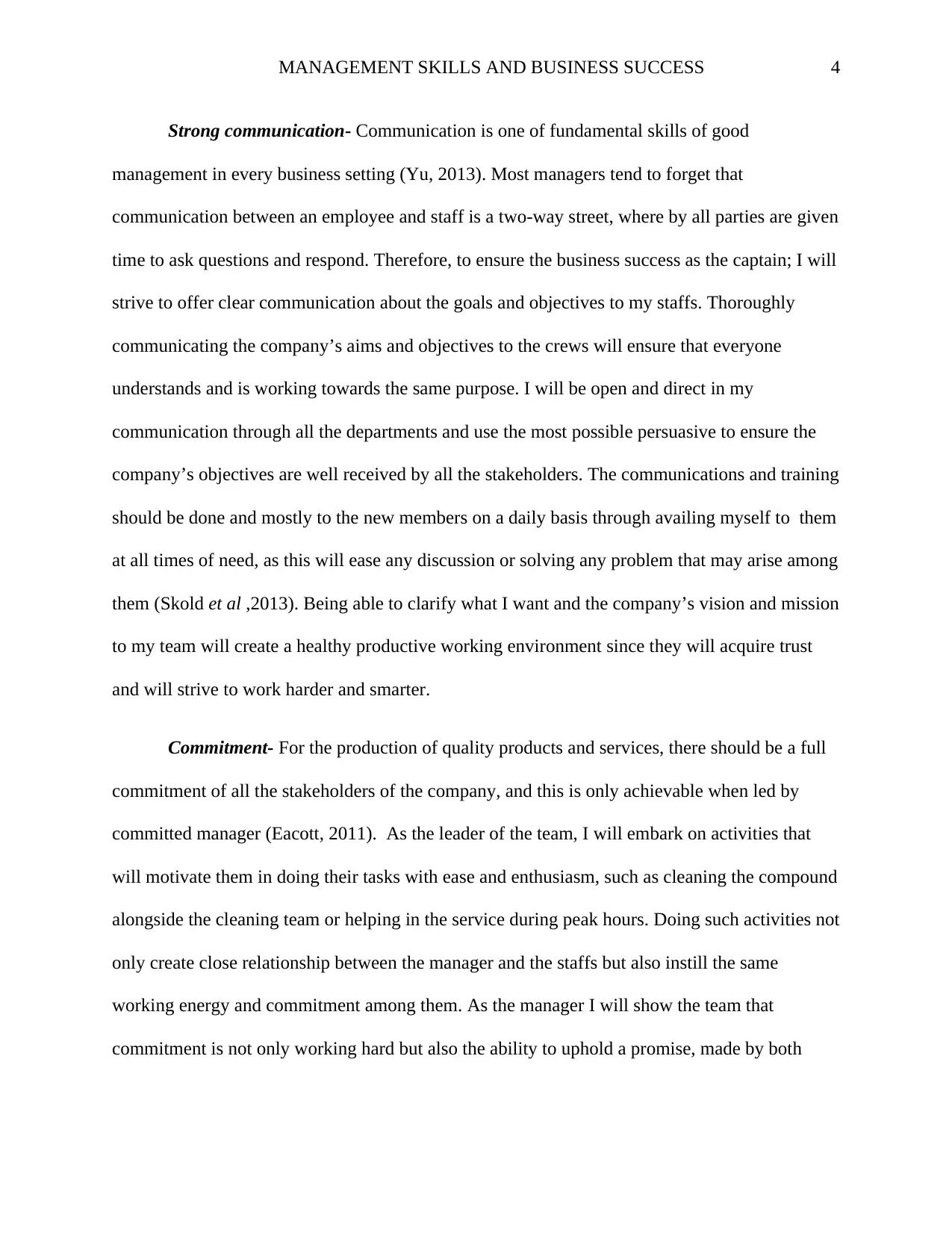
MANAGEMENT SKILLS AND BUSINESS SUCCESS 4
Strong communication- Communication is one of fundamental skills of good
management in every business setting (Yu, 2013). Most managers tend to forget that
communication between an employee and staff is a two-way street, where by all parties are given
time to ask questions and respond. Therefore, to ensure the business success as the captain; I will
strive to offer clear communication about the goals and objectives to my staffs. Thoroughly
communicating the company’s aims and objectives to the crews will ensure that everyone
understands and is working towards the same purpose. I will be open and direct in my
communication through all the departments and use the most possible persuasive to ensure the
company’s objectives are well received by all the stakeholders. The communications and training
should be done and mostly to the new members on a daily basis through availing myself to them
at all times of need, as this will ease any discussion or solving any problem that may arise among
them (Skold et al ,2013). Being able to clarify what I want and the company’s vision and mission
to my team will create a healthy productive working environment since they will acquire trust
and will strive to work harder and smarter.
Commitment- For the production of quality products and services, there should be a full
commitment of all the stakeholders of the company, and this is only achievable when led by
committed manager (Eacott, 2011). As the leader of the team, I will embark on activities that
will motivate them in doing their tasks with ease and enthusiasm, such as cleaning the compound
alongside the cleaning team or helping in the service during peak hours. Doing such activities not
only create close relationship between the manager and the staffs but also instill the same
working energy and commitment among them. As the manager I will show the team that
commitment is not only working hard but also the ability to uphold a promise, made by both
Strong communication- Communication is one of fundamental skills of good
management in every business setting (Yu, 2013). Most managers tend to forget that
communication between an employee and staff is a two-way street, where by all parties are given
time to ask questions and respond. Therefore, to ensure the business success as the captain; I will
strive to offer clear communication about the goals and objectives to my staffs. Thoroughly
communicating the company’s aims and objectives to the crews will ensure that everyone
understands and is working towards the same purpose. I will be open and direct in my
communication through all the departments and use the most possible persuasive to ensure the
company’s objectives are well received by all the stakeholders. The communications and training
should be done and mostly to the new members on a daily basis through availing myself to them
at all times of need, as this will ease any discussion or solving any problem that may arise among
them (Skold et al ,2013). Being able to clarify what I want and the company’s vision and mission
to my team will create a healthy productive working environment since they will acquire trust
and will strive to work harder and smarter.
Commitment- For the production of quality products and services, there should be a full
commitment of all the stakeholders of the company, and this is only achievable when led by
committed manager (Eacott, 2011). As the leader of the team, I will embark on activities that
will motivate them in doing their tasks with ease and enthusiasm, such as cleaning the compound
alongside the cleaning team or helping in the service during peak hours. Doing such activities not
only create close relationship between the manager and the staffs but also instill the same
working energy and commitment among them. As the manager I will show the team that
commitment is not only working hard but also the ability to uphold a promise, made by both
Paraphrase This Document
Need a fresh take? Get an instant paraphrase of this document with our AI Paraphraser
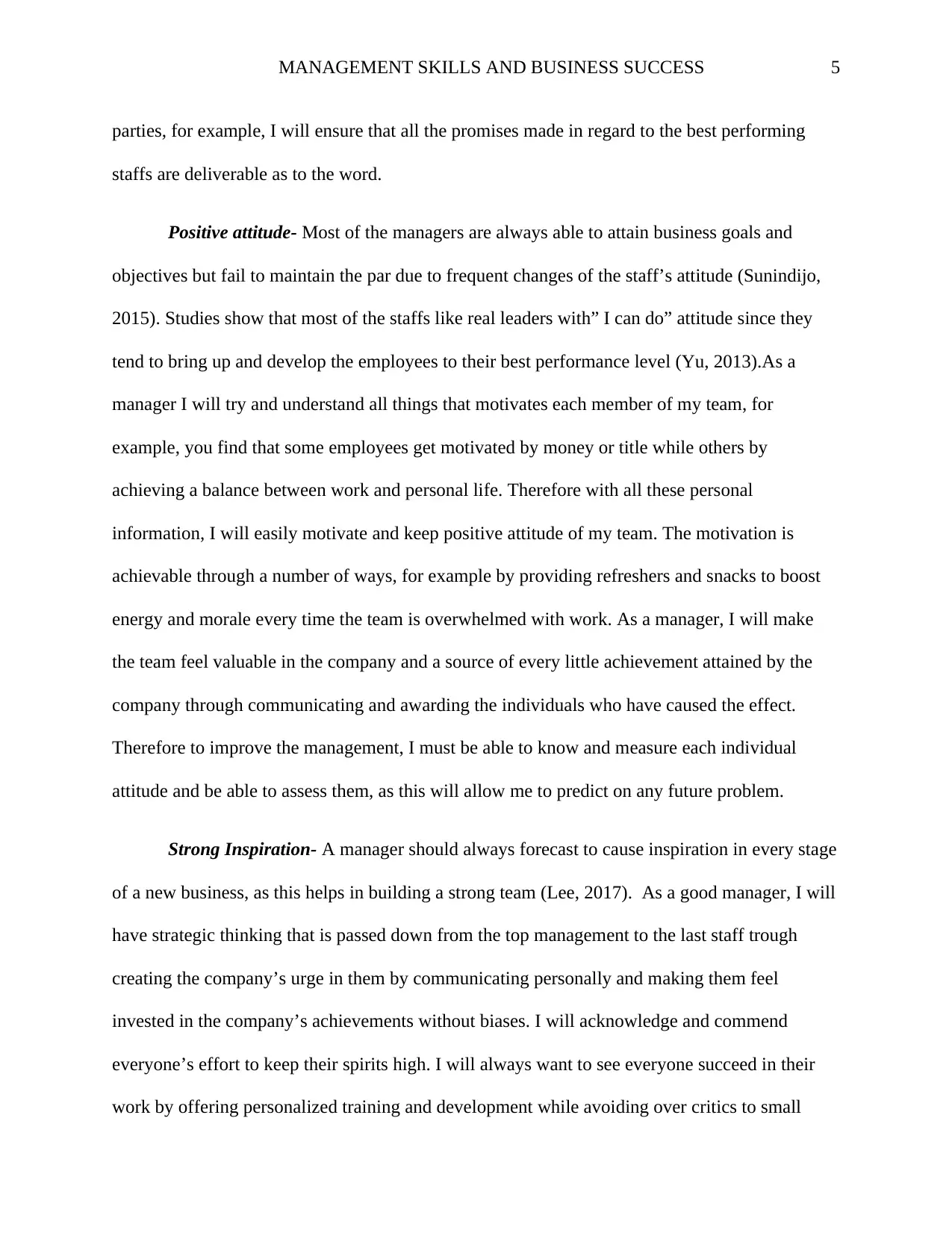
MANAGEMENT SKILLS AND BUSINESS SUCCESS 5
parties, for example, I will ensure that all the promises made in regard to the best performing
staffs are deliverable as to the word.
Positive attitude- Most of the managers are always able to attain business goals and
objectives but fail to maintain the par due to frequent changes of the staff’s attitude (Sunindijo,
2015). Studies show that most of the staffs like real leaders with” I can do” attitude since they
tend to bring up and develop the employees to their best performance level (Yu, 2013).As a
manager I will try and understand all things that motivates each member of my team, for
example, you find that some employees get motivated by money or title while others by
achieving a balance between work and personal life. Therefore with all these personal
information, I will easily motivate and keep positive attitude of my team. The motivation is
achievable through a number of ways, for example by providing refreshers and snacks to boost
energy and morale every time the team is overwhelmed with work. As a manager, I will make
the team feel valuable in the company and a source of every little achievement attained by the
company through communicating and awarding the individuals who have caused the effect.
Therefore to improve the management, I must be able to know and measure each individual
attitude and be able to assess them, as this will allow me to predict on any future problem.
Strong Inspiration- A manager should always forecast to cause inspiration in every stage
of a new business, as this helps in building a strong team (Lee, 2017). As a good manager, I will
have strategic thinking that is passed down from the top management to the last staff trough
creating the company’s urge in them by communicating personally and making them feel
invested in the company’s achievements without biases. I will acknowledge and commend
everyone’s effort to keep their spirits high. I will always want to see everyone succeed in their
work by offering personalized training and development while avoiding over critics to small
parties, for example, I will ensure that all the promises made in regard to the best performing
staffs are deliverable as to the word.
Positive attitude- Most of the managers are always able to attain business goals and
objectives but fail to maintain the par due to frequent changes of the staff’s attitude (Sunindijo,
2015). Studies show that most of the staffs like real leaders with” I can do” attitude since they
tend to bring up and develop the employees to their best performance level (Yu, 2013).As a
manager I will try and understand all things that motivates each member of my team, for
example, you find that some employees get motivated by money or title while others by
achieving a balance between work and personal life. Therefore with all these personal
information, I will easily motivate and keep positive attitude of my team. The motivation is
achievable through a number of ways, for example by providing refreshers and snacks to boost
energy and morale every time the team is overwhelmed with work. As a manager, I will make
the team feel valuable in the company and a source of every little achievement attained by the
company through communicating and awarding the individuals who have caused the effect.
Therefore to improve the management, I must be able to know and measure each individual
attitude and be able to assess them, as this will allow me to predict on any future problem.
Strong Inspiration- A manager should always forecast to cause inspiration in every stage
of a new business, as this helps in building a strong team (Lee, 2017). As a good manager, I will
have strategic thinking that is passed down from the top management to the last staff trough
creating the company’s urge in them by communicating personally and making them feel
invested in the company’s achievements without biases. I will acknowledge and commend
everyone’s effort to keep their spirits high. I will always want to see everyone succeed in their
work by offering personalized training and development while avoiding over critics to small
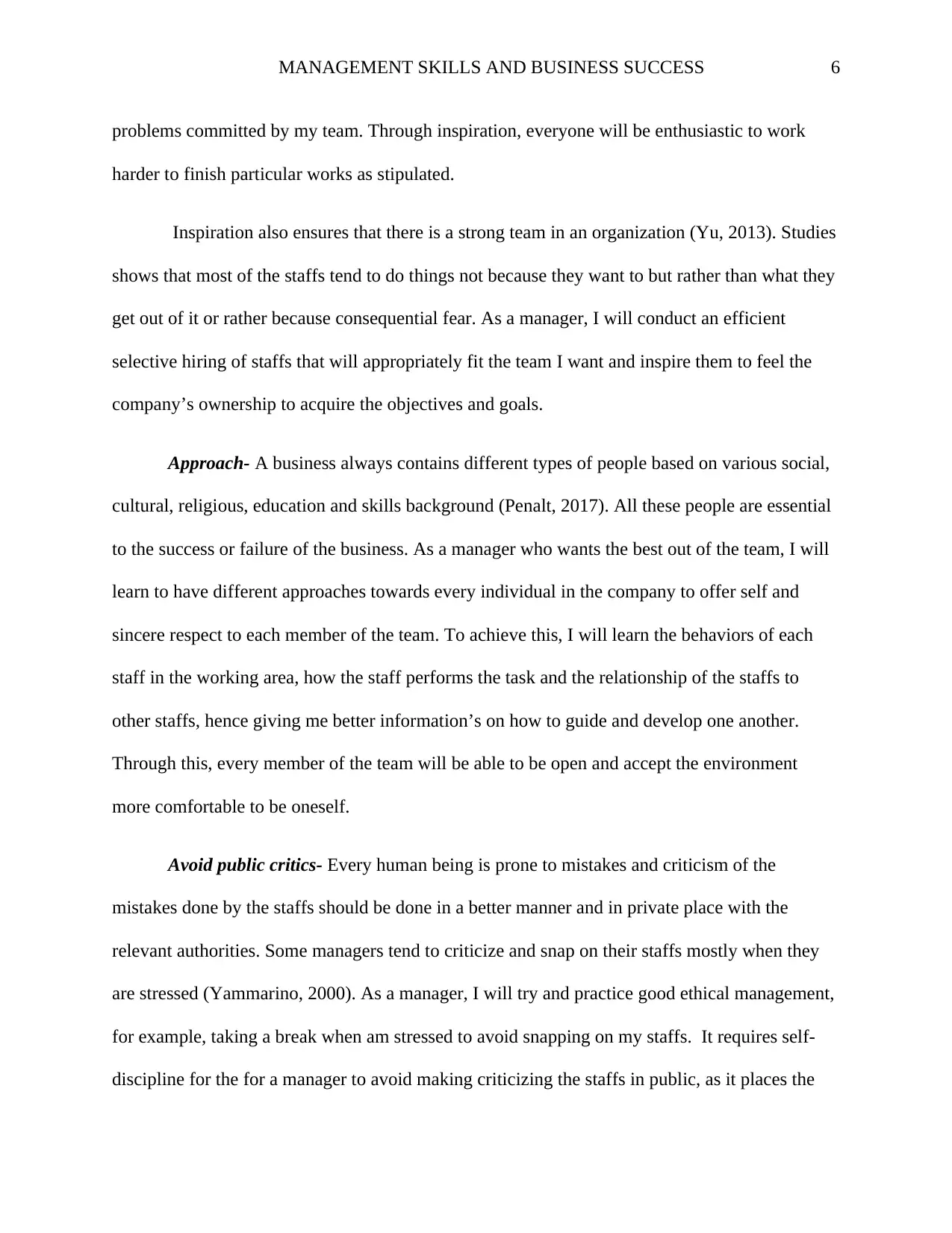
MANAGEMENT SKILLS AND BUSINESS SUCCESS 6
problems committed by my team. Through inspiration, everyone will be enthusiastic to work
harder to finish particular works as stipulated.
Inspiration also ensures that there is a strong team in an organization (Yu, 2013). Studies
shows that most of the staffs tend to do things not because they want to but rather than what they
get out of it or rather because consequential fear. As a manager, I will conduct an efficient
selective hiring of staffs that will appropriately fit the team I want and inspire them to feel the
company’s ownership to acquire the objectives and goals.
Approach- A business always contains different types of people based on various social,
cultural, religious, education and skills background (Penalt, 2017). All these people are essential
to the success or failure of the business. As a manager who wants the best out of the team, I will
learn to have different approaches towards every individual in the company to offer self and
sincere respect to each member of the team. To achieve this, I will learn the behaviors of each
staff in the working area, how the staff performs the task and the relationship of the staffs to
other staffs, hence giving me better information’s on how to guide and develop one another.
Through this, every member of the team will be able to be open and accept the environment
more comfortable to be oneself.
Avoid public critics- Every human being is prone to mistakes and criticism of the
mistakes done by the staffs should be done in a better manner and in private place with the
relevant authorities. Some managers tend to criticize and snap on their staffs mostly when they
are stressed (Yammarino, 2000). As a manager, I will try and practice good ethical management,
for example, taking a break when am stressed to avoid snapping on my staffs. It requires self-
discipline for the for a manager to avoid making criticizing the staffs in public, as it places the
problems committed by my team. Through inspiration, everyone will be enthusiastic to work
harder to finish particular works as stipulated.
Inspiration also ensures that there is a strong team in an organization (Yu, 2013). Studies
shows that most of the staffs tend to do things not because they want to but rather than what they
get out of it or rather because consequential fear. As a manager, I will conduct an efficient
selective hiring of staffs that will appropriately fit the team I want and inspire them to feel the
company’s ownership to acquire the objectives and goals.
Approach- A business always contains different types of people based on various social,
cultural, religious, education and skills background (Penalt, 2017). All these people are essential
to the success or failure of the business. As a manager who wants the best out of the team, I will
learn to have different approaches towards every individual in the company to offer self and
sincere respect to each member of the team. To achieve this, I will learn the behaviors of each
staff in the working area, how the staff performs the task and the relationship of the staffs to
other staffs, hence giving me better information’s on how to guide and develop one another.
Through this, every member of the team will be able to be open and accept the environment
more comfortable to be oneself.
Avoid public critics- Every human being is prone to mistakes and criticism of the
mistakes done by the staffs should be done in a better manner and in private place with the
relevant authorities. Some managers tend to criticize and snap on their staffs mostly when they
are stressed (Yammarino, 2000). As a manager, I will try and practice good ethical management,
for example, taking a break when am stressed to avoid snapping on my staffs. It requires self-
discipline for the for a manager to avoid making criticizing the staffs in public, as it places the
⊘ This is a preview!⊘
Do you want full access?
Subscribe today to unlock all pages.

Trusted by 1+ million students worldwide
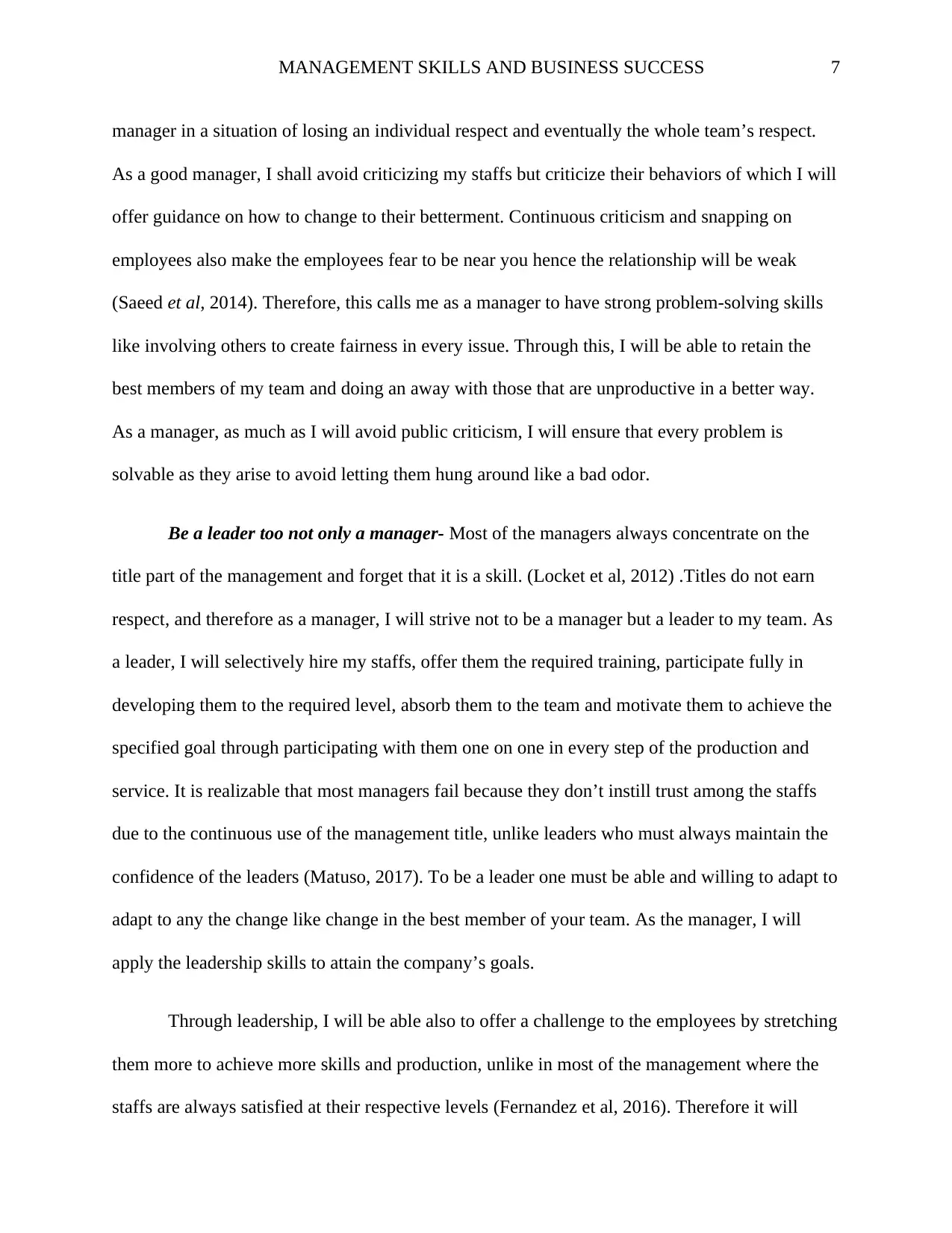
MANAGEMENT SKILLS AND BUSINESS SUCCESS 7
manager in a situation of losing an individual respect and eventually the whole team’s respect.
As a good manager, I shall avoid criticizing my staffs but criticize their behaviors of which I will
offer guidance on how to change to their betterment. Continuous criticism and snapping on
employees also make the employees fear to be near you hence the relationship will be weak
(Saeed et al, 2014). Therefore, this calls me as a manager to have strong problem-solving skills
like involving others to create fairness in every issue. Through this, I will be able to retain the
best members of my team and doing an away with those that are unproductive in a better way.
As a manager, as much as I will avoid public criticism, I will ensure that every problem is
solvable as they arise to avoid letting them hung around like a bad odor.
Be a leader too not only a manager- Most of the managers always concentrate on the
title part of the management and forget that it is a skill. (Locket et al, 2012) .Titles do not earn
respect, and therefore as a manager, I will strive not to be a manager but a leader to my team. As
a leader, I will selectively hire my staffs, offer them the required training, participate fully in
developing them to the required level, absorb them to the team and motivate them to achieve the
specified goal through participating with them one on one in every step of the production and
service. It is realizable that most managers fail because they don’t instill trust among the staffs
due to the continuous use of the management title, unlike leaders who must always maintain the
confidence of the leaders (Matuso, 2017). To be a leader one must be able and willing to adapt to
adapt to any the change like change in the best member of your team. As the manager, I will
apply the leadership skills to attain the company’s goals.
Through leadership, I will be able also to offer a challenge to the employees by stretching
them more to achieve more skills and production, unlike in most of the management where the
staffs are always satisfied at their respective levels (Fernandez et al, 2016). Therefore it will
manager in a situation of losing an individual respect and eventually the whole team’s respect.
As a good manager, I shall avoid criticizing my staffs but criticize their behaviors of which I will
offer guidance on how to change to their betterment. Continuous criticism and snapping on
employees also make the employees fear to be near you hence the relationship will be weak
(Saeed et al, 2014). Therefore, this calls me as a manager to have strong problem-solving skills
like involving others to create fairness in every issue. Through this, I will be able to retain the
best members of my team and doing an away with those that are unproductive in a better way.
As a manager, as much as I will avoid public criticism, I will ensure that every problem is
solvable as they arise to avoid letting them hung around like a bad odor.
Be a leader too not only a manager- Most of the managers always concentrate on the
title part of the management and forget that it is a skill. (Locket et al, 2012) .Titles do not earn
respect, and therefore as a manager, I will strive not to be a manager but a leader to my team. As
a leader, I will selectively hire my staffs, offer them the required training, participate fully in
developing them to the required level, absorb them to the team and motivate them to achieve the
specified goal through participating with them one on one in every step of the production and
service. It is realizable that most managers fail because they don’t instill trust among the staffs
due to the continuous use of the management title, unlike leaders who must always maintain the
confidence of the leaders (Matuso, 2017). To be a leader one must be able and willing to adapt to
adapt to any the change like change in the best member of your team. As the manager, I will
apply the leadership skills to attain the company’s goals.
Through leadership, I will be able also to offer a challenge to the employees by stretching
them more to achieve more skills and production, unlike in most of the management where the
staffs are always satisfied at their respective levels (Fernandez et al, 2016). Therefore it will
Paraphrase This Document
Need a fresh take? Get an instant paraphrase of this document with our AI Paraphraser
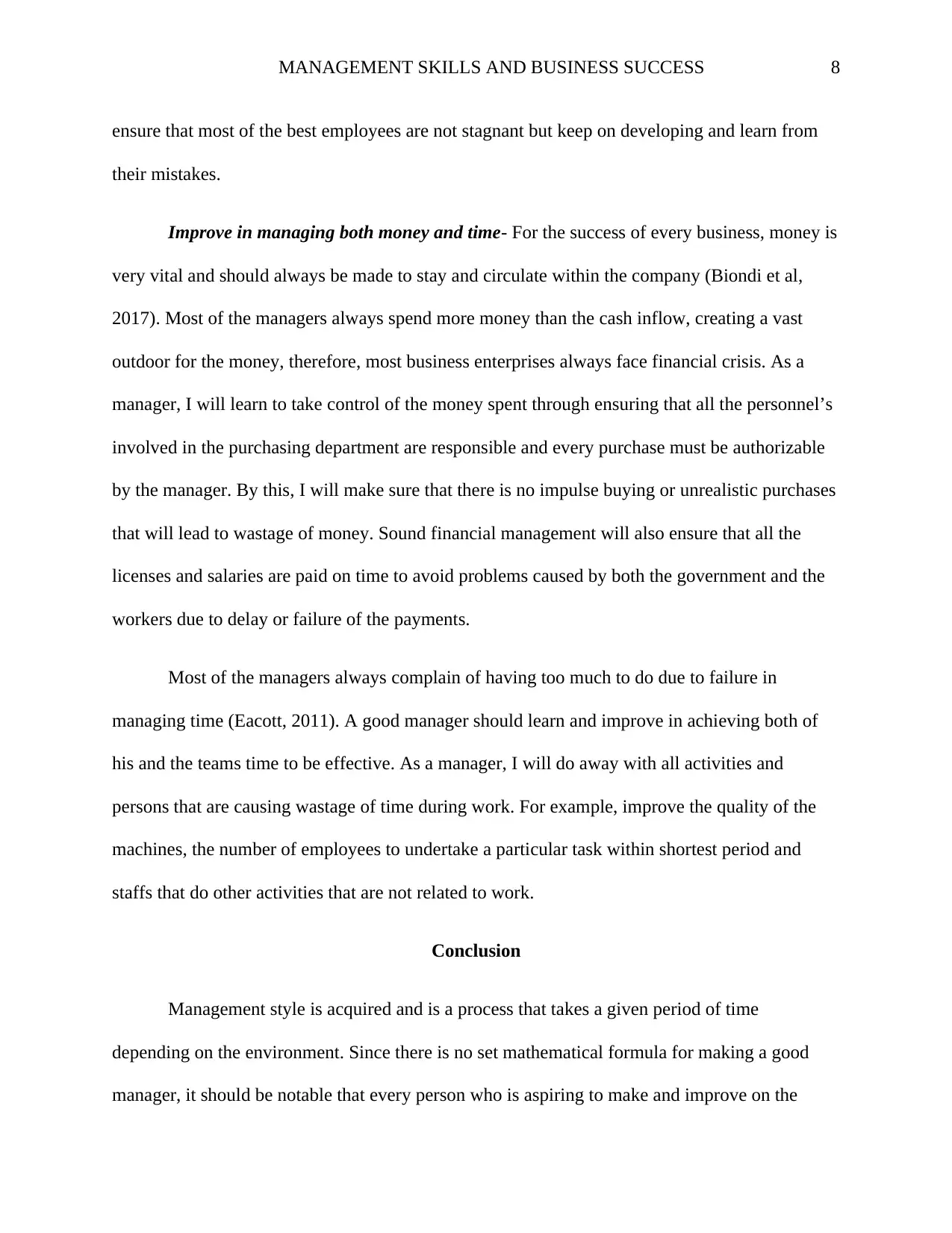
MANAGEMENT SKILLS AND BUSINESS SUCCESS 8
ensure that most of the best employees are not stagnant but keep on developing and learn from
their mistakes.
Improve in managing both money and time- For the success of every business, money is
very vital and should always be made to stay and circulate within the company (Biondi et al,
2017). Most of the managers always spend more money than the cash inflow, creating a vast
outdoor for the money, therefore, most business enterprises always face financial crisis. As a
manager, I will learn to take control of the money spent through ensuring that all the personnel’s
involved in the purchasing department are responsible and every purchase must be authorizable
by the manager. By this, I will make sure that there is no impulse buying or unrealistic purchases
that will lead to wastage of money. Sound financial management will also ensure that all the
licenses and salaries are paid on time to avoid problems caused by both the government and the
workers due to delay or failure of the payments.
Most of the managers always complain of having too much to do due to failure in
managing time (Eacott, 2011). A good manager should learn and improve in achieving both of
his and the teams time to be effective. As a manager, I will do away with all activities and
persons that are causing wastage of time during work. For example, improve the quality of the
machines, the number of employees to undertake a particular task within shortest period and
staffs that do other activities that are not related to work.
Conclusion
Management style is acquired and is a process that takes a given period of time
depending on the environment. Since there is no set mathematical formula for making a good
manager, it should be notable that every person who is aspiring to make and improve on the
ensure that most of the best employees are not stagnant but keep on developing and learn from
their mistakes.
Improve in managing both money and time- For the success of every business, money is
very vital and should always be made to stay and circulate within the company (Biondi et al,
2017). Most of the managers always spend more money than the cash inflow, creating a vast
outdoor for the money, therefore, most business enterprises always face financial crisis. As a
manager, I will learn to take control of the money spent through ensuring that all the personnel’s
involved in the purchasing department are responsible and every purchase must be authorizable
by the manager. By this, I will make sure that there is no impulse buying or unrealistic purchases
that will lead to wastage of money. Sound financial management will also ensure that all the
licenses and salaries are paid on time to avoid problems caused by both the government and the
workers due to delay or failure of the payments.
Most of the managers always complain of having too much to do due to failure in
managing time (Eacott, 2011). A good manager should learn and improve in achieving both of
his and the teams time to be effective. As a manager, I will do away with all activities and
persons that are causing wastage of time during work. For example, improve the quality of the
machines, the number of employees to undertake a particular task within shortest period and
staffs that do other activities that are not related to work.
Conclusion
Management style is acquired and is a process that takes a given period of time
depending on the environment. Since there is no set mathematical formula for making a good
manager, it should be notable that every person who is aspiring to make and improve on the
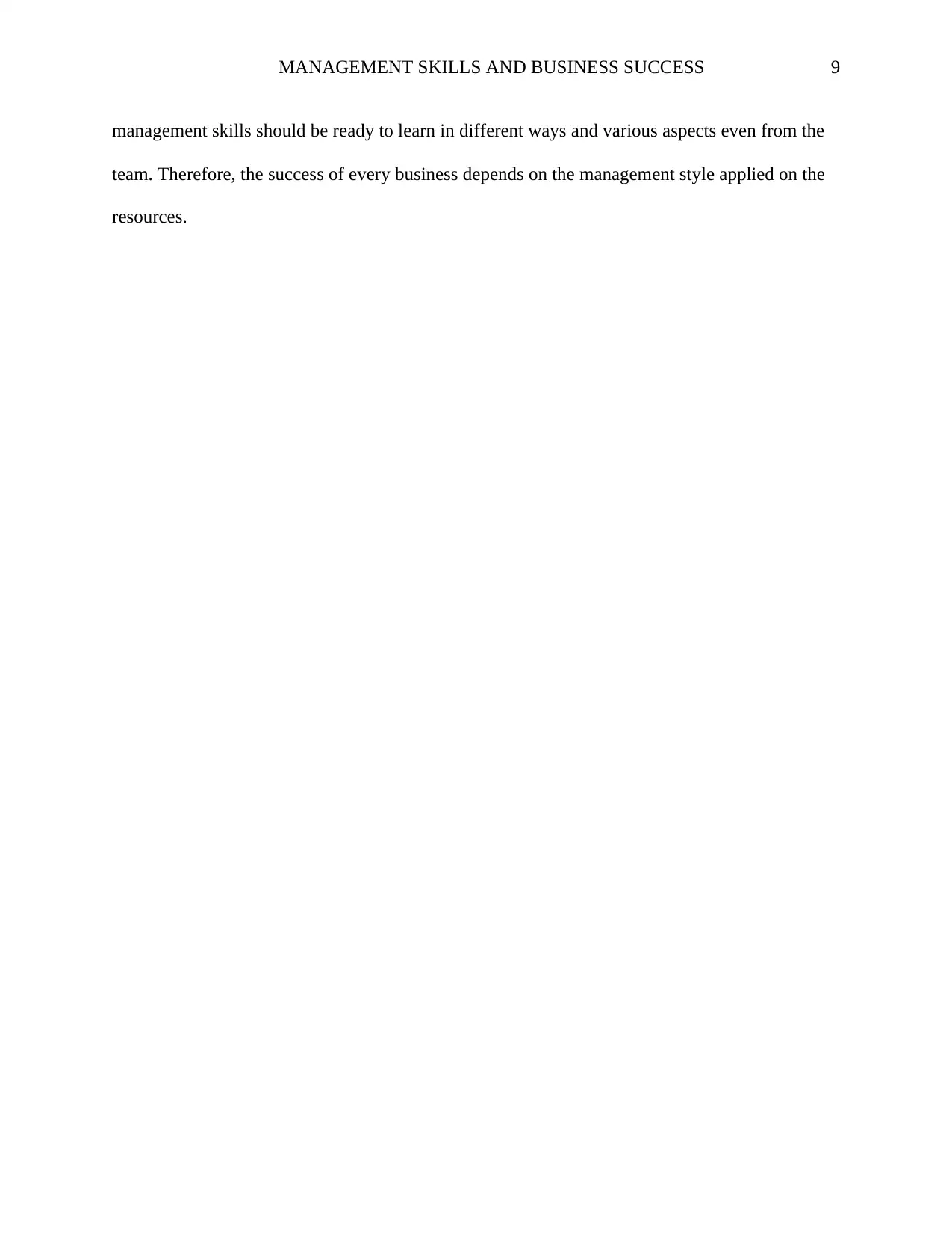
MANAGEMENT SKILLS AND BUSINESS SUCCESS 9
management skills should be ready to learn in different ways and various aspects even from the
team. Therefore, the success of every business depends on the management style applied on the
resources.
management skills should be ready to learn in different ways and various aspects even from the
team. Therefore, the success of every business depends on the management style applied on the
resources.
⊘ This is a preview!⊘
Do you want full access?
Subscribe today to unlock all pages.

Trusted by 1+ million students worldwide
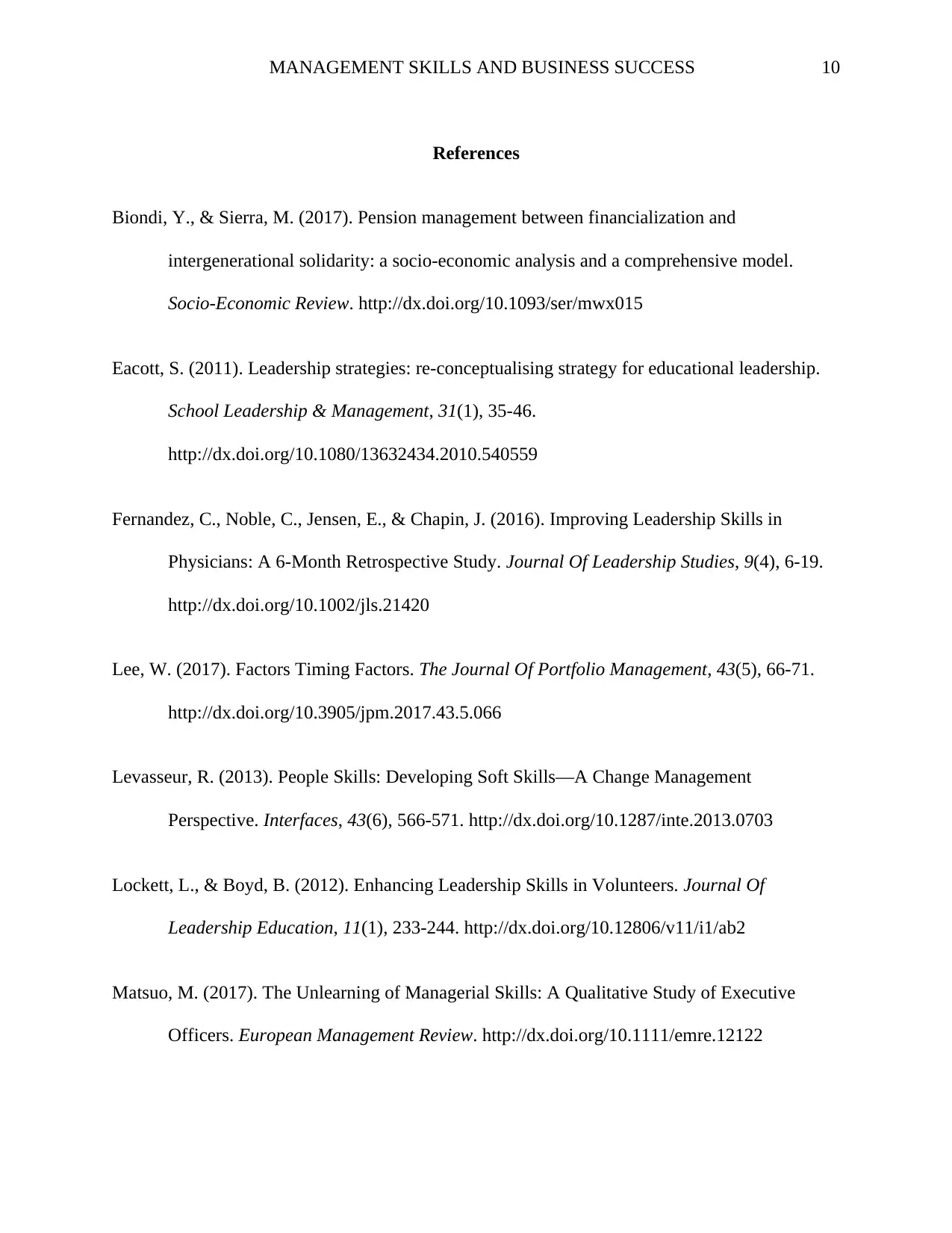
MANAGEMENT SKILLS AND BUSINESS SUCCESS 10
References
Biondi, Y., & Sierra, M. (2017). Pension management between financialization and
intergenerational solidarity: a socio-economic analysis and a comprehensive model.
Socio-Economic Review. http://dx.doi.org/10.1093/ser/mwx015
Eacott, S. (2011). Leadership strategies: re-conceptualising strategy for educational leadership.
School Leadership & Management, 31(1), 35-46.
http://dx.doi.org/10.1080/13632434.2010.540559
Fernandez, C., Noble, C., Jensen, E., & Chapin, J. (2016). Improving Leadership Skills in
Physicians: A 6-Month Retrospective Study. Journal Of Leadership Studies, 9(4), 6-19.
http://dx.doi.org/10.1002/jls.21420
Lee, W. (2017). Factors Timing Factors. The Journal Of Portfolio Management, 43(5), 66-71.
http://dx.doi.org/10.3905/jpm.2017.43.5.066
Levasseur, R. (2013). People Skills: Developing Soft Skills—A Change Management
Perspective. Interfaces, 43(6), 566-571. http://dx.doi.org/10.1287/inte.2013.0703
Lockett, L., & Boyd, B. (2012). Enhancing Leadership Skills in Volunteers. Journal Of
Leadership Education, 11(1), 233-244. http://dx.doi.org/10.12806/v11/i1/ab2
Matsuo, M. (2017). The Unlearning of Managerial Skills: A Qualitative Study of Executive
Officers. European Management Review. http://dx.doi.org/10.1111/emre.12122
References
Biondi, Y., & Sierra, M. (2017). Pension management between financialization and
intergenerational solidarity: a socio-economic analysis and a comprehensive model.
Socio-Economic Review. http://dx.doi.org/10.1093/ser/mwx015
Eacott, S. (2011). Leadership strategies: re-conceptualising strategy for educational leadership.
School Leadership & Management, 31(1), 35-46.
http://dx.doi.org/10.1080/13632434.2010.540559
Fernandez, C., Noble, C., Jensen, E., & Chapin, J. (2016). Improving Leadership Skills in
Physicians: A 6-Month Retrospective Study. Journal Of Leadership Studies, 9(4), 6-19.
http://dx.doi.org/10.1002/jls.21420
Lee, W. (2017). Factors Timing Factors. The Journal Of Portfolio Management, 43(5), 66-71.
http://dx.doi.org/10.3905/jpm.2017.43.5.066
Levasseur, R. (2013). People Skills: Developing Soft Skills—A Change Management
Perspective. Interfaces, 43(6), 566-571. http://dx.doi.org/10.1287/inte.2013.0703
Lockett, L., & Boyd, B. (2012). Enhancing Leadership Skills in Volunteers. Journal Of
Leadership Education, 11(1), 233-244. http://dx.doi.org/10.12806/v11/i1/ab2
Matsuo, M. (2017). The Unlearning of Managerial Skills: A Qualitative Study of Executive
Officers. European Management Review. http://dx.doi.org/10.1111/emre.12122
Paraphrase This Document
Need a fresh take? Get an instant paraphrase of this document with our AI Paraphraser
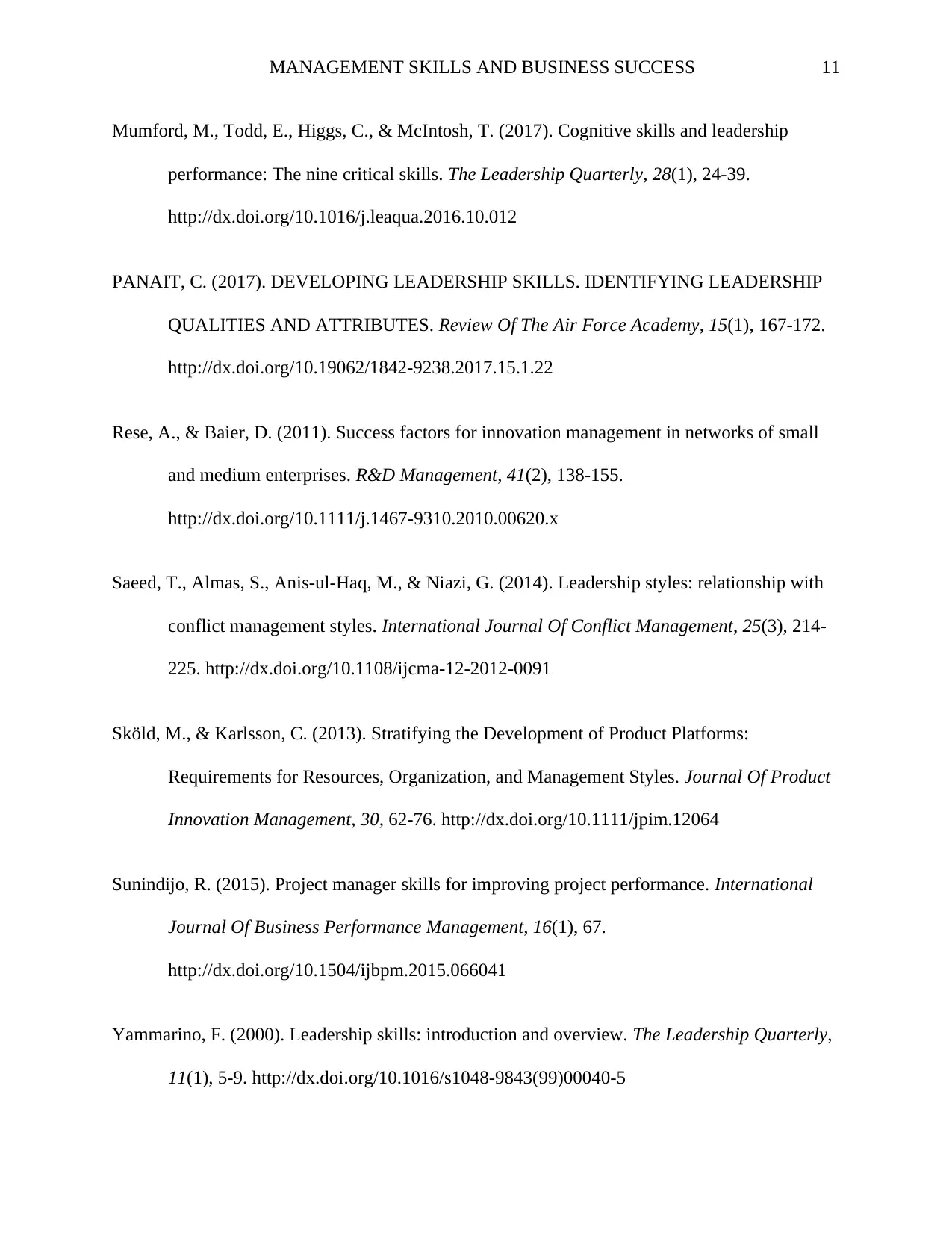
MANAGEMENT SKILLS AND BUSINESS SUCCESS 11
Mumford, M., Todd, E., Higgs, C., & McIntosh, T. (2017). Cognitive skills and leadership
performance: The nine critical skills. The Leadership Quarterly, 28(1), 24-39.
http://dx.doi.org/10.1016/j.leaqua.2016.10.012
PANAIT, C. (2017). DEVELOPING LEADERSHIP SKILLS. IDENTIFYING LEADERSHIP
QUALITIES AND ATTRIBUTES. Review Of The Air Force Academy, 15(1), 167-172.
http://dx.doi.org/10.19062/1842-9238.2017.15.1.22
Rese, A., & Baier, D. (2011). Success factors for innovation management in networks of small
and medium enterprises. R&D Management, 41(2), 138-155.
http://dx.doi.org/10.1111/j.1467-9310.2010.00620.x
Saeed, T., Almas, S., Anis-ul-Haq, M., & Niazi, G. (2014). Leadership styles: relationship with
conflict management styles. International Journal Of Conflict Management, 25(3), 214-
225. http://dx.doi.org/10.1108/ijcma-12-2012-0091
Sköld, M., & Karlsson, C. (2013). Stratifying the Development of Product Platforms:
Requirements for Resources, Organization, and Management Styles. Journal Of Product
Innovation Management, 30, 62-76. http://dx.doi.org/10.1111/jpim.12064
Sunindijo, R. (2015). Project manager skills for improving project performance. International
Journal Of Business Performance Management, 16(1), 67.
http://dx.doi.org/10.1504/ijbpm.2015.066041
Yammarino, F. (2000). Leadership skills: introduction and overview. The Leadership Quarterly,
11(1), 5-9. http://dx.doi.org/10.1016/s1048-9843(99)00040-5
Mumford, M., Todd, E., Higgs, C., & McIntosh, T. (2017). Cognitive skills and leadership
performance: The nine critical skills. The Leadership Quarterly, 28(1), 24-39.
http://dx.doi.org/10.1016/j.leaqua.2016.10.012
PANAIT, C. (2017). DEVELOPING LEADERSHIP SKILLS. IDENTIFYING LEADERSHIP
QUALITIES AND ATTRIBUTES. Review Of The Air Force Academy, 15(1), 167-172.
http://dx.doi.org/10.19062/1842-9238.2017.15.1.22
Rese, A., & Baier, D. (2011). Success factors for innovation management in networks of small
and medium enterprises. R&D Management, 41(2), 138-155.
http://dx.doi.org/10.1111/j.1467-9310.2010.00620.x
Saeed, T., Almas, S., Anis-ul-Haq, M., & Niazi, G. (2014). Leadership styles: relationship with
conflict management styles. International Journal Of Conflict Management, 25(3), 214-
225. http://dx.doi.org/10.1108/ijcma-12-2012-0091
Sköld, M., & Karlsson, C. (2013). Stratifying the Development of Product Platforms:
Requirements for Resources, Organization, and Management Styles. Journal Of Product
Innovation Management, 30, 62-76. http://dx.doi.org/10.1111/jpim.12064
Sunindijo, R. (2015). Project manager skills for improving project performance. International
Journal Of Business Performance Management, 16(1), 67.
http://dx.doi.org/10.1504/ijbpm.2015.066041
Yammarino, F. (2000). Leadership skills: introduction and overview. The Leadership Quarterly,
11(1), 5-9. http://dx.doi.org/10.1016/s1048-9843(99)00040-5
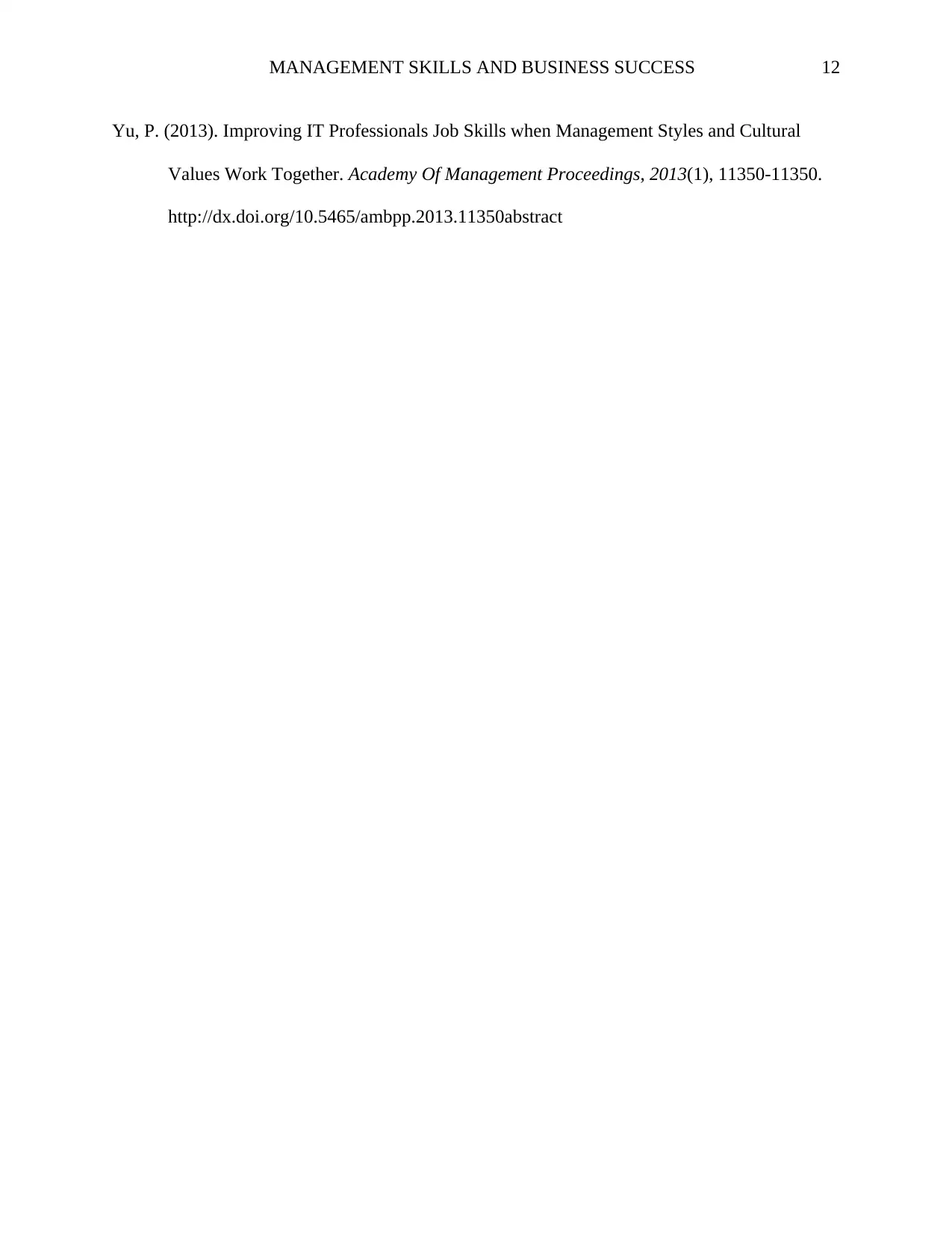
MANAGEMENT SKILLS AND BUSINESS SUCCESS 12
Yu, P. (2013). Improving IT Professionals Job Skills when Management Styles and Cultural
Values Work Together. Academy Of Management Proceedings, 2013(1), 11350-11350.
http://dx.doi.org/10.5465/ambpp.2013.11350abstract
Yu, P. (2013). Improving IT Professionals Job Skills when Management Styles and Cultural
Values Work Together. Academy Of Management Proceedings, 2013(1), 11350-11350.
http://dx.doi.org/10.5465/ambpp.2013.11350abstract
⊘ This is a preview!⊘
Do you want full access?
Subscribe today to unlock all pages.

Trusted by 1+ million students worldwide
1 out of 12
Related Documents
Your All-in-One AI-Powered Toolkit for Academic Success.
+13062052269
info@desklib.com
Available 24*7 on WhatsApp / Email
![[object Object]](/_next/static/media/star-bottom.7253800d.svg)
Unlock your academic potential
Copyright © 2020–2025 A2Z Services. All Rights Reserved. Developed and managed by ZUCOL.




